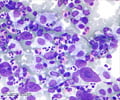Research indicates that body weight and dietary choices in young adulthood can trigger non-Hodgkin lymphoma in later life.

To expand those findings, Bertrand and colleagues evaluated the association of obesity, specific types of dietary fats and fruits and vegetables with risk for NHL.
Researchers analyzed questionnaire responses from 47,541 men followed for 22 years in the Health Professionals' Follow-Up Study and 91,227 women followed for 28 years in the Nurses' Health Study.
Among the women, researchers confirmed 966 incident diagnoses of NHL through 2008, and among the men, they confirmed 566 cases through 2006.
"In analyses that controlled for age, race and other factors, we found that obesity in young adulthood (ages 18 to 21 years) was associated with risk for NHL later in life," Bertrand said.
"Men who were obese (body mass index [BMI] equal to or greater than 30) [in young adulthood] had a 64 percent higher risk for NHL compared with men who were lean, while obese women had a 19 percent higher risk."
Advertisement
Although total and specific dietary fats were not associated with NHL risk, findings also suggested that women who consumed the highest amounts of trans fat in their diets had a nonstatistically significant increased risk for NHL overall.
Advertisement
The results were recently presented at the 10th AACR International Conference on Frontiers in Cancer Prevention Research.
Source-ANI















